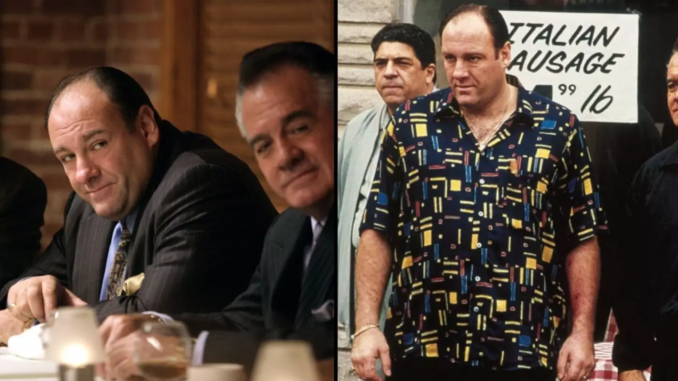
The Sopranos: From Enduring TV Hit to the Hottest Show of Lockdown
In the world of television, few shows have left as lasting a cultural footprint as The Sopranos. What started as a groundbreaking series in 1999 became a defining show of its era. But in a surprising twist, the mob drama that we all thought was part of TV’s history saw a stunning resurgence during the COVID-19 lockdowns. Suddenly, Tony Soprano and his crew were back in the conversation, taking center stage in homes across the world. How did The Sopranos, a show that aired nearly two decades ago, become the hottest binge-watch of the pandemic? Let’s dive into the factors that led to this unexpected rise in popularity, and why The Sopranos remains the show we couldn’t stop watching—even in lockdown.
The Sopranos: A Show That Stood the Test of Time
It’s hard to believe that The Sopranos first premiered on HBO more than 20 years ago. Yet, it’s a show that continues to captivate audiences both new and old. With its complex characters, intricate plots, and razor-sharp social commentary, it’s no surprise that people continue to rediscover and rewatch this television masterpiece. But what made it a particular hit during the pandemic?

Rewatching the Classics: A Comforting Escape
During the lockdowns, many people sought comfort in familiar TV shows, and The Sopranos became the perfect escape. With its long episodes and complex characters, the show offered an immersive experience, allowing viewers to dive deep into its world. The comfort of rewatching a beloved show—especially one with such a rich history—became a way to pass time while navigating an uncertain and often isolating period.
The Rise of Nostalgia During Lockdown
As the pandemic swept across the globe, people turned to nostalgic content to bring them comfort. Shows that had left an indelible mark on culture became the perfect distractions. The Sopranos wasn’t just a show; it was a cultural touchstone. With its iconic characters and memorable moments, it evoked nostalgia for a time before the world was turned upside down. Revisiting it provided a sense of continuity in a time of chaos.
The Pandemic and the Return of the Antihero
At the heart of The Sopranos was Tony Soprano, a character who redefined the antihero for a new generation. During the COVID-19 lockdowns, it seemed like viewers were more drawn to morally complex characters than ever before. Was it the collective sense of disillusionment brought on by the pandemic that made Tony’s struggle with his identity, power, and family more relatable than ever? Likely, yes.
Why We’re Still Fascinated by Tony Soprano
Tony Soprano’s character is a brilliant study in contradictions. He’s both a ruthless mafia boss and a man who’s deeply vulnerable, navigating his mental health, family issues, and feelings of inadequacy. During lockdown, as people faced personal struggles of their own, Tony’s multifaceted character provided both an escape and a mirror. His issues with family, power, and morality mirrored the anxieties many were feeling, making him not just a character in a TV show but an almost therapeutic figure.
The Antihero Boom: A Trend Accelerated by the Pandemic
The pandemic wasn’t just a time for rewatching old favorites; it was also a moment when the appeal of antiheroes reached new heights. Shows like Breaking Bad, Mad Men, and Better Call Saul also saw increased viewership during lockdowns. These complex, morally gray characters seemed to provide a form of catharsis for an audience grappling with the emotional fallout of a world in turmoil.
A Story for Our Times: Themes That Resonate Amidst Crisis
The Sopranos was never just about the mafia. The show dealt with power, family dynamics, and the American Dream in a way that spoke to the human experience. Its exploration of mental health, specifically Tony’s struggles with depression and anxiety, became even more relevant as the pandemic triggered a global mental health crisis.
Mental Health: A Central Theme That Took on New Meaning
One of the most compelling aspects of The Sopranos was its exploration of mental health, particularly Tony’s therapy sessions with Dr. Melfi. As lockdowns forced many to confront their own isolation and emotional struggles, the themes of self-reflection, therapy, and personal growth took on new resonance. Tony’s attempts to balance his violent nature with his need for psychological healing mirrored the feelings of vulnerability many were experiencing during uncertain times.
Family in Crisis: A Reflection of the Lockdown Experience
The concept of family was another major theme in The Sopranos. Tony’s constant push-pull relationship with his wife, Carmela, his children, and his overbearing mother highlighted the dysfunction and complexities of family life. During the lockdown, many people found themselves stuck at home with family members, amplifying both the positive and negative aspects of familial relationships. The Sopranos offered a window into how families cope with stress, both internal and external, and how power dynamics shift in times of crisis.
The Sopranos and the Social Media Resurgence
While the show had always had a dedicated fanbase, The Sopranos saw a massive resurgence on social media during the lockdown. Viewers flocked to Twitter, Instagram, and Reddit to discuss their favorite episodes, post memes, and debate the show’s iconic ending.
The Power of Meme Culture: Bringing the Show to a New Generation
The rise of meme culture during the pandemic played a huge role in The Sopranos’ second wave of popularity. As younger generations discovered the show, they began to engage with it in new ways, turning iconic moments into viral content. Tony Soprano’s famous line “What, you think I’m funny?” became a meme staple. Fans started sharing their favorite quotes, moments, and character analyses, ensuring that The Sopranos continued to dominate social media conversations.
Lockdown Watch Parties and Fan Theories
For many, the lockdown presented a unique opportunity to binge-watch The Sopranos from start to finish. Virtual watch parties on Zoom or social media became a way to connect with friends and discuss theories. Fans revisited the show’s most pivotal moments, from the shocking deaths to the mysterious final scene, with some even starting their own theories about Tony’s fate.
A Rebirth in Popularity: The Sopranos’ Lasting Legacy
By the end of the lockdown, The Sopranos wasn’t just a show people had revisited; it had cemented itself as a pop culture phenomenon for a new generation. The show’s impact reached far beyond television, influencing everything from fashion to music to the language of pop culture.
Why The Sopranos Will Never Be Forgotten
The Sopranos didn’t just change TV; it changed the cultural landscape. Its influence can still be seen today in the ways shows portray complex characters and morally gray narratives. As we reflect on its resurgence during the pandemic, it’s clear that the themes and characters of The Sopranos continue to resonate, even in a time as chaotic as a global pandemic.
Conclusion: The Sopranos – The Show We Couldn’t Refuse, Then and Now
The resurgence of The Sopranos during the COVID-19 lockdown proves that great television never truly goes out of style. What made it such a perfect fit for the pandemic era was its emotional depth, its complex characters, and its relevance to the struggles people were facing in real life. As we continue to navigate an uncertain world, The Sopranos offers both a window into the past and a mirror for the present, reminding us that the best stories are those that connect with our deepest fears, desires, and insecurities.
FAQs
1. Why did The Sopranos become so popular during the pandemic?
The pandemic created a time of nostalgia and introspection, and The Sopranos’ themes of mental health, family dynamics, and moral ambiguity resonated deeply with people experiencing isolation and uncertainty.
2. What is the significance of Tony Soprano’s character in the context of the pandemic?
Tony’s complex personality—his struggles with anxiety, depression, and his role as both a powerful mob boss and a vulnerable family man—mirrored the emotional complexities many people faced during lockdown.
3. How did social media contribute to the revival of The Sopranos?
Social media allowed fans to engage in conversations, share memes, and create viral content about The Sopranos, bringing the show to new audiences and generating buzz.
4. Why is The Sopranos considered a cultural landmark?
The show redefined television by blending complex storytelling, deep character development, and cinematic quality, setting a standard for modern TV and influencing a new generation of shows.